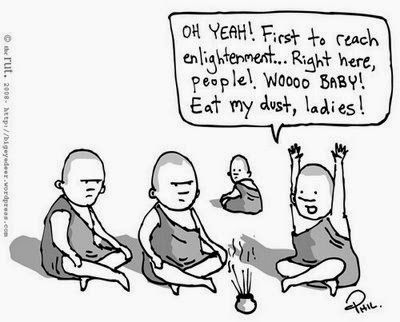 |
| A monastic, having purified the heart/mind, reflects on the teaching and awakens. Here a meditator is seen in the jungle, Songkla, Thailand (Bird_beckman77 Homam Alojail/flickr). |
.
 |
| Enlightenment fast! (bigeyedeer) |
The briefest teaching that led to sudden enlightenment was delivered by the Buddha to Bahiya of the Barkcloth (Bāhiya Dārucīriya), an old ascetic who traveled a long, long way to ask the Buddha to teach him the Dharma. But Bahiya came at an inopportune time, and the Buddha asked him to wait. Bahiya asked and asked again, and the Buddha perceived that it would be fruitful to disregard his regular schedule and teach Bahiya in brief. But what he taught him was enigmatic, perplexing, hard to unravel. Bahiya understood it and became an arhat, a full enlightened person almost on the spot by reflecting on the teaching. Here the same teaching is given to elderly Ven. Malunkyaputta with a little more being said.
 |
| Light dawns (leyinkeu/flickr). |
[Ven. Malunkyaputta once asked the Buddha:] "It would be well for me, venerable sir, if the Blessed One would teach me in brief the Dharma so that having heard it I might dwell alone, in seclusion [with mind and body withdrawn in meditation, free sensual desires and distractions], unwearied, ardent, and resolute."
"Well now, Malunkyaputta, what am I to say to the younger monastics if you -- a frail, aged, venerable person, far gone in years, at the end of your life -- ask for instruction in brief?"
"What do you think of this, Malunkyaputta? Objects cognizable by the eye, not seen, which you have never seen before, which you do not see now and do not wish to see -- have you any desire, lust, or fondness for them?"
"No indeed, venerable sir."
[The Buddha then asks the same with regard to the other five senses and their objects: sounds, scents, flavors, tangible things, and mental objects.]
"Well then, Malunkyaputta, in things seen, heard, otherwise-sensed [muta, i.e., smelled, tasted, or touched], or cognized: in the seen there will be only the seen, in the heard only the heard, in the otherwise-sensed only the sensed, in the cognized only the cognized... Then, Malunkyaputta, there will be no 'thereby' for you.
- "Thereby"? This is almost impossible to translate adequately. There is no agent, i.e., no "seer," "feeler," "knower." "There will be no 'thereby' whereby one will be lustful, hateful, or deluded (SA [SN commentary])."
"Having no 'thereby' you have no 'there.'
- If there is no agent (i.e., no "self"), then there is nowhere such an agent can be located. "You will have no 'there'": You will not be bound or attached "there," i.e., with regard to the seen, heard, otherwise-sensed, or cognized (SA).
 |
| "Whoa the individual ego does not exist. I am so freakin' enlightened. (MarkStivers.com) |
"Having no 'there,' Malunkyaputta, there is for you neither this world, nor the next, nor anywhere in between. [That is, you will realize that nothing is really reborn.] That in itself is the end of all suffering."
- [Nirvana is the end of all suffering when one knows and sees it, directly experiences it, and realizes that the Truth has always been true and is liberating from all delusion, from all suffering.]
"Indeed, venerable sir, I understand in full the meaning of what the Blessed One has stated in brief."
Forms perceived cause loss of mindfulness,
If we dwell on their endearing charms,
Passion grips the heart, and feeling flows,
Clinging has us firmly in its grip:
So emotions rise and grow in strength,
Of diverse kinds, all based on what was seen.
Some of greed and some of hatred born --
Grievously they all afflict the heart of a person,
Heaping up a store of pain and woe:
Thus for that person nirvana's far away.
[Similarly for sounds, scents, tastes, tangibles, thoughts.]
One who's not inflamed by things one sees,
[Similarly for sounds, scents, tastes, tangibles, thoughts.]
One who's not inflamed by things one sees,
Seeing forms retains mindfulness,
Not in passion's grip, simply feels,
On this person clinging cannot get a hold.
If one just observes the things one sees,
Not reacting to their shape or form,
One will pull down the pile, not build it up.
Mindfully proceeding on one's way,
Heaping up no store of pain and woe:
Then for that person nirvana's very near.
[Similarly for sounds, scents, tastes, tangibles, thoughts.]
"Indeed, venerable sir, I understand in full the meaning of what the Blessed One has stated in brief."
[The Buddha confirms Malunkyaputta's words; in due course Malunkyaputta becomes an arhat, that is, a fully enlightened individual.]
No comments:
Post a Comment